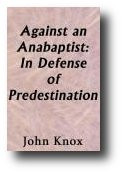 Loading... Please wait...
Loading... Please wait...- SWRB Home
-
Free Resources
- Short Listings Of Free Reformation & Creation Resources
- Free Reformed, Puritan, Covenanter and Creationist Videos
- Thousands of Links to Free Audio, Video and Printed Resources
- Free Puritan Books, Reformed MP3s, and Calvinist Videos
- Puritan Quotes, Free Reformation MP3s, Reformed Books and Calvinist Videos From PuritanDownloads.com On FaceBook
- Shipping & Returns
- Blog
- Privacy Policy
- Contact Us
- Payment Options
- Help
-
About Us
- Sitemap
Pastor Scott Brown, on the left in the video above, is the Director of the National Center for Family-Integrated Churches (NCFIC)
Resource Categories
- PURITAN HARD DRIVE REVIEWS
- PASTOR ROB VENTURA ON THE PURITAN HARD DRIVE
- DR. VODDIE BAUCHAM, JR. ON THE PURITAN HARD DRIVE
- R. C. SPROUL ON SWRB
- DR. JOEL R. BEEKE ON THE PURITAN HARD DRIVE
- PASTOR GREG L. PRICE ON THE PURITAN HARD DRIVE
- DR. MATTHEW MCMAHON ON THE PURITAN HARD DRIVE
- PASTOR SCOTT BROWN ON THE PURITAN HARD DRIVE
- PASTOR W. J. MENCAROW ON THE PURITAN HARD DRIVE
- JOAQUIN FERNANDEZ ON THE PURITAN HARD DRIVE
- PASTOR DAVID SILVERSIDES ON THE PURITAN HARD DRIVE
- JOHN HENDRYX ON THE PURITAN HARD DRIVE
- PASTOR KEVIN GUILLORY ON THE PURITAN HARD DRIVE
- RICHARD BENNETT ON THE PURITAN HARD DRIVE
- DR. KENNY RHODES ON THE PURITAN HARD DRIVE
- JUSTIN RAWSON ON THE PURITAN HARD DRIVE
- PASTOR JAMES WALLACE ON THE PURITAN HARD DRIVE
- PASTOR RICHARD GAGNON ON THE PURITAN HARD DRIVE
- PASTOR JOE HAYNES ON THE PURITAN HARD DRIVE
- DR. STEVEN DILDAY ON THE PURITAN HARD DRIVE
- PASTOR ANDREW COMPTON ON THE PURITAN HARD DRIVE
- TERENCE ELLARD ON THE PURITAN HARD DRIVE
- PASTOR JERRY JOHNSON ON THE PURITAN HARD DRIVE
- PASTOR DAVID PETRIE ON THE PURITAN HARD DRIVE
- JIM DODSON ON THE PURITAN HARD DRIVE
- PASTOR BRIAN SCHWERTLEY ON THE PURITAN HARD DRIVE
- PASTOR PHIL GIBSON ON THE PURITAN HARD DRIVE
- MEL R. EVERINGHAM II ON THE PURITAN HARD DRIVE
- PAUL BLYTH ON THE PURITAN HARD DRIVE
- STEVE KETTLER ON THE PURITAN HARD DRIVE
- D. M. (CALIFORNIA) ON THE PURITAN HARD DRIVE
- MICHAEL CAUGHRAN ON THE PURITAN HARD DRIVE
- WIILIAM NOPPER IV ON THE PURITAN HARD DRIVE
- LINDA THERIAULT ON THE PURITAN HARD DRIVE
- WILLIAM WARNOCK ON THE PURITAN HARD DRIVE
- ROBERT KOH ON THE PURITAN HARD DRIVE
- WHAT'S ON THE PURITAN HARD DRIVE?
- ALL PURITAN HARD DRIVE VIDEOS
- PHD-ODE INSTALLATION VIDEOS
- COMMENTS ON SWRB
- ALL PURITAN QUOTE VIDEOS
- PURITAN HARD DRIVE SCREENSHOTS
- PURITAN HARD DRIVE MINISTRY AND DONATION OFFERS
- TABLE OF RESOURCE CATEGORIES
- Advanced Studies
- SWRB SERMONAUDIO MOBILE APP
- Apologetics
- Assurance
- Attributes and Holiness of God
- Augustine
- Banner of Truth
- Baptism
- Beginners
- Bibles (Geneva, KJV, Hexapla, etc.)
- Biblical Counseling
- BIBLICAL HD COLLECTION
- Biblical Interpretation (Hermeneutics)
- Biographies and Autobiographies
- Calvinism and the Sovereignty of God
- CALVINISM HD COLLECTION
- CALVINIST CLASSICS HD COLLECTION
- Charles Spurgeon
- Children's Books
- CHRISTIAN EDUCATION HD COLLECTION
- Christian History
- Church Government
- Civil Government and Resistance
- CLASSIC CHRISTIAN HD COLLECTION
- Classic Puritan and Reformed Sets
- Commentaries
- Contemporary Issues
- Covenant Theology and Covenanting
- COVENANTER HD COLLECTION
- Covenanters and Covenanted Reformation
- Creation and Creationism
- Creeds, Confessions and Covenants
- Cults, False Religions, Psychology, Humanism
- Dealing with Affliction, Suffering, and Sickness
- Debates
- Dutch Reformed
- Education and Home Schooling
- English Puritans, Covenanters and Reformers
- Family, Children, Home, and Family Worship
- First Reformation
- Five Points of Calvinism (TULIP)
- For Pastors and Elders
- For Seminary Students
- FREE PURITAN & REFORMATION MP3 AUDIO SERMONS/BOOKS
- FREE PURITAN BOOKS, REFORMATION MP3s, PDFs, VIDEOs
- George Gillespie
- God's Law, The Ten Commandments, etc.
- Greg L. Price on Headcoverings
- Heaven, Hell and the Final Judgment
- Holy Days (Lord's Day, Christmas, Easter, etc.)
- HOME SCHOOL HD COLLECTION
- Intermediate Studies
- John Bunyan
- John Calvin
- John Knox
- John Owen
- Jonathan Edwards
- Justification
- Languages, Dictionaries, Reference, etc.
- LOOK WHO LOVES THE PURITAN HARD DRIVE
- Lord's Supper (Communion)
- Marriage, Courtship, etc.
- Martin Luther and Lutheranism
- Martyrs and Persecution
- Other Protestant Works
- Predestination and Providence
- PRESBYTERIAN HD COLLECTION
- Presbyterians and Presbyterianism
- Prophecy, Antichrist, and Eschatology
- PROTESTANT HD COLLECTION
- PSALM SINGING MP3s (COMPLETE SET)
- Psalters, Psalm Singing and Music
- Puritan Facts
- PURITAN FAST SERMONS (1640-1653) - 34 VOLS SET
- Puritan Fast Sermons 1640-1653
- Puritans and Puritanism
- PURITAN HARD DRIVE
- REFORMATION HD COLLECTION
- Reformation History
- Reformed and Puritan Classics
- Reformed Baptist
- REFORMED BAPTIST HD COLLECTION
- REFORMED HD COLLECTION
- REFORMED PRESBYTERIAN HD COLLECTION
- Reformed Presbytery, RPNA Protesters, etc.
- Reformed Theology
- Reformed Worship, The Regulative Principle, etc.
- Roman Catholicism, the Jesuits, Islam, etc.
- Salvation and Evangelism
- Samuel Rutherford
- Sanctification, Prayer and Holiness
- Scottish Covenanters
- Scottish Presbyterianism
- Scripture Song MP3s (Psalms and Bibles Verses)
- Second Reformation
- Separation, Unity, Uniformity, etc.
- Sermons and Sermon Collections
- Solemn League and Covenant
- Theology and Doctrine
- Third Reformation
- Thomas Watson
- Westminster Confession, Assembly and Divines
- Authors (All A to Z)
Phone Orders:
(780) 450-3730
To obtain free Reformation books, Puritan MP3s and Calvinistic videos, SWRB discount coupons, etc., add yourself to SWRB's Puritan and Reformed email list by using the form above.
Against an Anabaptist: In Defense of Predestination by John Knox
Resource Details
Resource Description
Curt Daniel calls this "Knox's major theological work."
Moreover, he states that this is "more than a short answer (to the Anabaptist--RB, 468 pages), it is a complete exposition and defence of the Reformed doctrine at the height of the Scottish Reformation" which helped "guide early Presbyterianism and build the theological bridge between Edinburgh and Geneva."
Furthrermore, Walker writes: "Very far from being a mere iconoclast, he (Knox) was also a great teacher of his country men... the long and elaborate treatise on Predestination, in which the doctrines of grace and of divine sovereignty are so vigorously, yet upon the whole so wisely, asserted and maintained -- gives Knox a high place among theologians" (Theology and Theologians of Scotland).
This work was much esteemed by Knox's Puritan friends in England and "Calderwood, in summing up Knox's character, remarks: 'How profound he was in divinity, that work of his upon Predestination may give evidence" (Laing. ed., p. 17).
Furthermore, Laing beautifully sets the context of this work, writing,
Thus it happened, that Roman Catholics, Arminians, and most of all Socinians endeavoured, in the sense of Pelagianism, or Semi-pelagianism, to reconcile the divine decrees with human liberty. On the other hand, both Lutherans and Calvinists, following the example of Augustine, rejected the notion of the freedom of the will, and denied every co-operation on the part of man.
Nevertheless it is a striking fact, that the Lutherans avoided the strict consequences of the Augustinian system, and asserted that the decrees of God are conditional, while the Calvinists not only admitted the necessity of those consequences, but having once determined the idea of Predestination, went so far as to maintain that the fall of man itself was predestinated by God, (Supralapsarianism)."
Quoting freely from Calvin, his major influence in this work, Knox lays low the heresy that man plays any part in his own salvation. This heresy, of man's pretended ability to save himself (in any way), is at the root of all defection from the sovereign God of Scripture and is rampant today!
As Kevin Reed notes, in refuting this Anabaptist, Knox unequivocally states, "For with the Pelagians and papists, you have become teachers of free will, and defenders of your own justice," clearly recognizing that, "the defence of man's free will, to do good and avoid evil," is "the damned heresy of Pelagius."
Moreover, regarding this work, Reed continues, "A perceptive reading of this dispute will reveal the parallels between the Anabaptists and modern proponents of free will. Advocates for free will are commonly found among Baptists, 'evangelicals,' Charismatics, and cultists. Their line of argumentation is virtually identical to that of Knox's opponent" (Kevin Reed, John Knox the Forgotten Reformer, pp. 219-20).
This book contains significant information for defeating the forces of antichrist today; for he (especially ecclesiastical antichrist) continues to manifest the same spirit of error seen in the days of Knox -- deceiving men into thinking that they, in some way (be it ever so small), are able to save themselves.
All resources for sale on this website, with the exception of Scottish Metrical Psalms MP3s, are available on the Puritan Hard Drive .
VIDEO INTRODUCTION TO THE PURITAN HARD DRIVE


Phone Orders:
(780) 450-3730
To obtain free Reformation books, Puritan MP3s and Calvinistic videos, SWRB discount coupons, etc., add yourself to SWRB's Puritan and Reformed email list by using the form above.








































